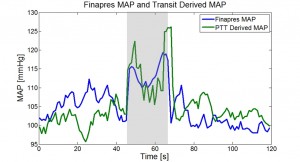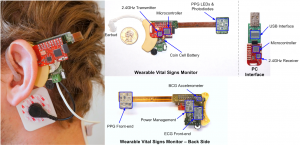A Wearable Vital-signs Monitor at the Ear
Vital signs such as heart rate, blood pressure, blood oxygenation, cardiac output, and respiratory rate are necessary in determining the overall health of a patient. Continuous monitoring of these vital signs can help healthcare workers assess the wearer’s overall state of health and identify risks for cardiovascular diseases[1].
We propose the site behind the ear as a location for an integrated wearable vital signs monitor[2]. This location offers physiological signals such as the electrocardiogram (ECG), the photoplethysmogram (PPG), and the ballistocardiogram (BCG). The ECG measures the electrical activity from the heart and offers heart rate information. The PPG measures the blood volume and color under the skin using optical illumination. The PPG offers information such as continuous heart rate and blood oxygenation. The BCG measures the body’s mechanical reaction to the blood expelled by the heart and also provides the heart rate.
Using the peak timing data from BCG and PPG, mean arterial blood pressure can be measured[3]. Figure 1 compares the continuous mean arterial blood pressure measured from a Portapres finger-cuff with the continuous blood pressure measurement from the vital signs monitor while a test subject performed a Valsalva maneuver.
The device is designed to use the ear as a discreet and a natural anchor that reduces device visibility and the need for skin adhesives. A photo of our prototype device is shown in Figure 2. While the prototype currently uses off-the-shelf components, custom integrated circuits are being designed to replace those components to significantly decrease the device’s size and power consumption.
- Figure 1: A comparison of mean arterial blood pressure measured by a Portapres finger-cuff (blue) and mean arterial blood pressure derived from peak timing information of the vital signs monitor (green) during a Valsalva maneuver.
- Figure 2: Left – The vital signs monitor being worn at the ear with ECG electrodes attached. Center – The wearable vital signs monitor. Right – A PC USB wireless receiver.
- S. D. Pierdomenico, M. Di Nicola, A. L. Esposito, R. Di Mascio, E. Ballone, D. Lapenna, and F. Cuccurullo, “Prognostic value of different indices of blood pressure variability in hypertensive patients,” American Journal of Hypertension, pp. 842-847, June 2009. [↩]
- D. He, E. S. Winokur, T. Heldt, and C. G. Sodini, “The ear as a location for wearable vital signs monitoring,” IEEE Engineering in Medicine and Biology Conference, pp. 6389-6392, Sept. 2010. [↩]
- E. S. Winokur, D. He, and C. G. Sodini, “A Wearable Vital Signs Monitor at the Ear for Continuous Heart Rate and Pulse Transit Time Measurements,” IEEE Engineering in Medicine and Biology Conference, pp. 2724-2727, Aug. 2012. [↩]

